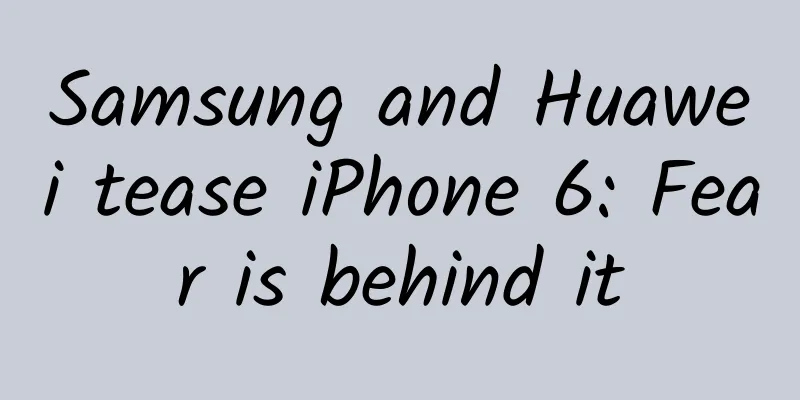Trillion-dollar market value? Don’t forget Apple’s fatal weakness

|
At present, the release of iPhone 6 has attracted unprecedented attention to Apple, while Samsung, Apple's only competitor in the high-end market, has shown a trend of sharp decline in performance. As Apple's brand influence in the high-end market continues to grow, the global smartphone market is likely to evolve from Samsung and Apple to Apple alone in the future. In this optimistic market context, American activist investor Carl Icahn recently sent an open letter to Apple, saying that the company's market value is underestimated and the reasonable stock price should be $203 per share, that is, Apple's market value should reach $1.2 trillion. At present, Apple's market value is close to $600 billion, far higher than international Internet giants Google, Facebook, Amazon and the three domestic Internet giants BAT. But in fact, no company can always be the best in the world, and Apple is no exception. The author believes that Apple's inherent shortcomings make it even less resistant to risks than these Internet giants. Behind the optimistic market value of Apple, the author also interprets Apple's fatal shortcomings. The core business of Internet giants has a strong software network ecological magnetic field and stickiness First of all, let's look at the differences between Apple, Google, Amazon, and even the domestic BAT in terms of core competitiveness. In fact, whether it is Google, Facebook, Amazon, or the domestic BAT, their core areas are search, social and e-commerce. For users, search, social, and e-commerce are rigid needs. In these three areas, once a comprehensive leading advantage is established, the longer the time, the more difficult it will be to subvert. Taking the domestic BAT as an example, Tencent is the well-deserved king of social. Almost all the social relationship chains of Chinese Internet users are deposited on QQ and WeChat. At present, it is almost unimaginable that any model and product can allow all QQ and WeChat users to migrate to another social software. The extremely high migration cost of users and the sedimentation of user social relationship chains make Tencent's Internet ecological model built with social as the core almost invincible. The same is true for Baidu and Alibaba. Baidu and Alibaba have accumulated deep technology, brand, content, and user stickiness in the fields of search and e-commerce respectively, and have formed their own ecosystems around search and e-commerce, and have formed a strong ecological magnetic field under the radiation of core businesses. The longer the time and the deeper the roots, the stronger the advantages. They continue to develop new business forms around their core businesses, strengthen their "shortcomings" in other segments, build strong moats, and form an advantageous ecological chain that is getting longer and longer, and increasingly difficult to subvert. But we also know that Apple's core competitiveness also lies in the closed model of software and hardware integration built around the iOS system. In an era of abundant hardware, Apple's software and hardware integration model can effectively avoid the risks of Moore's Law. Apple also relies on the iOS system to continuously provide users with high-quality services and content through iTunes and AppleStore. The previously released Homekit "connects the family" with the cooperation of Siri voice technology, CarPlay can connect to the car, and Healthkit can "connect health". Apple can rely on the layout of software and hardware integration to continuously expand the boundaries of value-added services and connect everything. However, unlike Internet giants such as Google, Amazon, BAT, etc., the fatal shortcoming of Apple's ecosystem is that it is highly dependent on hardware. We know that Apple's brand premium is highly dependent on the iPhone series of mobile phones. We can see that although the iPhone 6 still has good sales, the indisputable fact is that the iPhone 6 shows a trend of lack of innovation from technology to craftsmanship. The 4.7 and 5.5 screen sizes of the iPhone 6 finally compromised with the large screen. From a disruptor to a follower, Apple has gradually become mediocre. To some extent, it can be considered that Apple is relying on the high brand premium formed by the disruptive innovation brought by Jobs. Then the question is, if Apple cannot conquer users in hardware one day, how can the software layout attached to the iPhone hardware be discussed? Fragile: Apple's brand premium is highly dependent on mobile phone hardware Because we have seen that the fragility of smartphone hardware brands is reflected in the fact that many aspects, such as quality, innovation, craftsmanship, safety, and competitors' layout, will affect the rise or fall of Apple's brand image. Because users who buy Apple phones must have high expectations due to the high costs. Users who buy Apple mobile phone hardware essentially have risks and expectations in terms of money, technical functions, social evaluation, safety, psychological demands, etc. We have seen that after the release of iPhone 6, Apple's appearance design was complained to have a sense of déjà vu of HTC, and then it was caught in the "hair gate" after the "bend gate". In addition, the system vulnerabilities frequently exposed in iOS 8 will cause documents in iCloud Drive to be permanently deleted when users select the "Reset All Settings" option on the iPhone. The service loophole on Apple's iCould that led to the leak of Hollywood nude photos has also made people begin to re-examine the security risks of the iPhone. This series of problems have affected users' purchasing demands. Once the experience is not good, it can be considered that users have suffered losses in the cost, psychological expectations and demands of purchasing an iPhone. Internet services that are positioned to meet users' basic needs (provided by giants such as Google, Amazon, BAT, etc.) are mostly free. If the experience is not good, users will suffer minimal losses in various costs such as money. Internet products can be iterated quickly, and functional repairs can be quickly "re-engineered", while hardware products are difficult to recover after being launched on the market, which will have a huge impact on everything from cost to brand. As I mentioned earlier, whether it is BAT or Google and Amazon, their core businesses are focused on the rigid needs of almost all Internet users in a certain area. The longer they take root and the deeper they are, the higher the stickiness will be after user habits are formed. In addition, Internet companies have the advantage of rapid iteration, which makes their core business and user experience more and more perfect, and they are almost not affected by market opinion and current fashion trends. Apple is different. The iPhone series of mobile phones are not a rigid need for users. With the rise of domestic mobile phones, user choices are more diversified. Since there is no relationship chain binding, the cost of user replacement and migration is quite low. At present, domestic mobile phones represented by China Cool Union are collectively focusing on the mid-to-high-end market. Huawei P7, Mate7, Lenovo's new flagship Lenovo VIBE Z2 Pro, ZTE Nubia series and other mid-to-high-end mobile phones are currently receiving considerable attention. In the future, they may also turn to the high-end market and target Apple. Of course, Apple's charm is still unstoppable, but with the accumulation of domestic mobile phone technology and the increase in brand penetration and the gradual strengthening of the hardware research and development system, domestic mobile phone manufacturers are further turning to the intensive cultivation of high-end brands. It is not impossible to slowly erode Apple's market share in the high-end market in the future. Another trend is that the high-end market for smart phones is close to saturation in developed countries, so Apple's anxiety lies not only in the disappearance of the demographic dividend in the high-end smart phone market, but also in the erosion of the market by competitors, so it must develop some new products to divert people's attention, such as Apple Watch. On the other hand, we see that because Apple has long positioned itself as a high-end brand, fashionable and technological elements are the cornerstones of its brilliance in the market. Once Apple’s innovation is weak, its design is mediocre, and users are aesthetically fatigued, and the other camp of Android phones further improves the software and hardware experience, Apple, which lacks hardware innovation, will face greater risks. Therefore, it can be said that Apple is also doing business with fans and users, but the stickiness of fans is almost highly dependent on Apple launching new products that make people scream, and in fact, this difficulty can be imagined. If the subsequent new products such as iPhone6s and iPhone7 continue to perform mediocrely, and fans’ expectations for Apple’s innovative hardware products continue to be frustrated, then the possibility of fans turning against Apple will be very high. It can be seen that Apple's positioning as a high-end smartphone brand has led to its high reliance on innovation to conquer users. Therefore, Apple's future innovations will also need to hit the preferences and pain points of current mainstream users. As mobile phone users' tastes are adjusted higher, it will become increasingly difficult for Apple to grasp user needs in terms of process design and technological innovation. In addition, with the maturity of the smartphone market, mobile phone users will form more rational judgments about high-end phones. It is hard to say that high-end market users will not develop aesthetic fatigue with the iPhone in the future. Therefore, Apple's high market value and brand premium are highly dependent on the iPhone to conquer users in hardware, and are very fragile. Hardware is too heavy: Apple's software ecosystem lacks killer products At the same time, we can look at it from another perspective. Can Apple take the path of counterattacking hardware brands through the layout of software advantages? At present, Apple does have this idea. We have seen the new Mac system Yosemite, smart home homekit, programming language Swift, Safari browser, etc. displayed at the Apple conference in June this year. And whether it is based on the car CarPlay that can be connected or the "connected health" Healthkit, it is this idea, that is, hoping to bind users with the software platform. But it can be seen that Apple's layout at the software level is basically strongly blocked by Google, and it is not irreplaceable. It still lacks killer software products that can challenge Internet companies such as Google and Facebook. Let me make a little wild imagination. Assuming that Apple can have a social software product similar to WeChat, which can gather the social relationship chain of all iOS users and firmly bind it to the iOS platform, then this will undoubtedly effectively improve the durability of the iPhone brand and even the entire software ecosystem, but this assumption is impossible. However, Apple lacks an advantage in software layout compared to the Internet, which makes its network services a shortcoming. For example, its online synchronization service MobileMe, social network Ping, and network services on Apple Maps have frequent mistakes and perform poorly compared with its competitors. In addition, Apple's big data advantage in connecting everything software layout has not yet been established. Fred Wilson, a famous venture capitalist, once pointed out Apple's weakness. He believes that although Apple built a large data center in North Carolina many years ago, Apple does not seem to have truly understood the huge impact of cloud computing on the technology industry. In this field, he believes that Apple has a half-hearted attitude towards big data. He said that iCloud is the latest example of Apple's many failed attempts in the field of cloud computing. In his opinion, iCloud is slow to respond and difficult to understand. But in fact, from the recent service loophole on Apple iCould that led to the leak of Hollywood nude photos, we can also seem to see Apple's shortcomings in cloud computing and big data, and connecting everything, big data advantages are obviously an unavoidable link. Therefore, if Apple's mobile phone hardware fails to attract users one day, the software ecosystem layout cannot occupy the rigid demand points of users, and it lacks the core advantages of competing with Internet giants in the software ecosystem and network services, how will Apple connect everything in the future? It can also be said that the hardware of the iPhone series of mobile phones can be seen as the cornerstone that supports the entire building of Apple's brand and the integrated hardware and software ecosystem. If the cornerstone becomes fragile, the risk to the entire building can be imagined. Therefore, we see that compared with international and domestic Internet giants such as Google, Amazon, and BAT, Apple has extended its core business from hardware to software ecosystem layout; while the latter have Internet software, platforms, and network services as their core businesses and then extended them to hardware layout. The ideas and models of the two are reversed, but in fact the hidden dangers and crises that arise from them are completely different, and this is where Apple's risks lie. As a winner of Toutiao's Qingyun Plan and Baijiahao's Bai+ Plan, the 2019 Baidu Digital Author of the Year, the Baijiahao's Most Popular Author in the Technology Field, the 2019 Sogou Technology and Culture Author, and the 2021 Baijiahao Quarterly Influential Creator, he has won many awards, including the 2013 Sohu Best Industry Media Person, the 2015 China New Media Entrepreneurship Competition Beijing Third Place, the 2015 Guangmang Experience Award, the 2015 China New Media Entrepreneurship Competition Finals Third Place, and the 2018 Baidu Dynamic Annual Powerful Celebrity. |
<<: Smart routing bubble emerges more like a "small door" than an "entrance"
>>: The concerns and worries behind Xiaomi's "no listing within five years"
Recommend
Google I/O 2016: Artificial Intelligence Becomes Product DNA
Following the developer conferences of Microsoft ...
Who can be trusted in home entertainment? The key to smart living room is to return to the essence
That's right, the intelligent transformation ...
How to improve conversion rate and encourage users to place more orders?
There are many scenarios for users to place order...
New media operation user growth skills!
Growth is from less to more. The root of all grow...
Top Growth Hackers: How to Use Data Experimentation to Build a Growth Engine
Growth hackers are the real source of revenue for...
If your mobile phone is not powerful enough, should a novice photographer buy a high-end old SLR?
When we buy digital IT products, we often use a pr...
Marine Life Illustrations | We also have real "mermaid" fish
(Source: Zhejiang Ocean University)...
The new year has just passed and the three key words of online live streaming in 2017
From the industry being ignited, to capital scram...
The big pit "made by the stars" hides unknown historical mysteries
Canada's famous Manigault crater In the long ...
Android application marketing strategy and plan
I often visit some small restaurants with good se...
On the first day of the new year, beautiful images came from Mars
On New Year's Day 2022, the National Space Ad...
Priced at over 3,000 yuan, can Le Max prove the “super name” of LeEco phones?
LeEco launched three new models at a press confer...
B station product analysis report! (2019)
From 2009 to now, in ten years, Bilibili has grow...
Is “supplementing what is lacking” precise nutrition? This is the key to cracking the code of longevity!
With the continuous deepening of the "Health...
How to hide your hot update bundle files?
[[379259]] This article is reprinted from the WeC...









